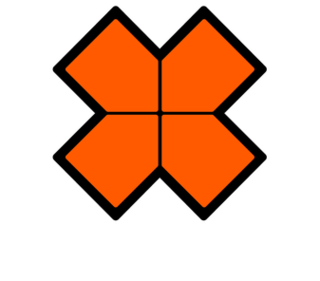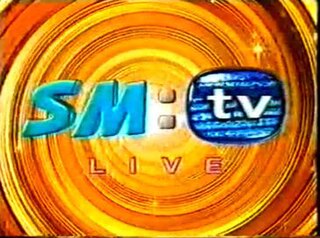
Xplay is a TV program about video games. The program, known for its reviews and comedy skits, aired on G4 in the United States and had aired on G4 Canada in Canada, FUEL TV in Australia, Ego in Israel, GXT in Italy, MTV Russia & Rambler TV in Russia, NET 25 & Solar Sports in the Philippines, and Adult Swim and MuchMusic in Latin America.

Dick & Dom in da Bungalow is a British children's television series presented by the duo Dick and Dom. The series was broadcast on weekend mornings for five series on the CBBC Channel, BBC One and BBC Two, running between 31 August 2002 and 11 March 2006.

The Big Breakfast is a British breakfast light entertainment television programme that was broadcast on Channel 4 from 1992 to 2002, and as a revival from 2021 to 2022. The show had various presenters, starting with Chris Evans and Gaby Roslin at launch with the revival episodes presented by Mo Gilligan and AJ Odudu.

Hey Hey It's Saturday was a long-running variety television program on Australian television. It initially ran for 28 years on the Nine Network from 9 October 1971 to 20 November 1999, with a recess in 1978. Its host throughout its entire run was Daryl Somers, who later also became executive producer of the program. The original producer, Gavan Disney, left the program in December 1990 and Somers then formed a production company, Somers Carroll Productions, with comedy writer and on-screen partner Ernie Carroll, the performer of Somers' pink ostrich puppet sidekick Ossie Ostrich. Carroll retired in 1994, and Ossie was no longer featured in the show.

Game Network was a European free-to-air television channel. It was initially owned by Digital Bros group, and later taken over by Cellcast Group. It was first launched in 1999.
Consolevania is a video games TV show filmed in and around Glasgow, Scotland. It is notable as one of very few online TV shows to make the leap onto broadcast TV as the show videoGaiden, which has had four series shown on BBC Scotland.

SMTV Live was a British Saturday morning children's television programme, produced by Blaze Television for ITV. Operating on a similar format to other Saturday morning programmes for children, such as BBC's Live & Kicking, the programme premiered on 29 August 1998 and ran for over 270 episodes across five years, before its conclusion on 27 December 2003.

.tv was a British television channel dedicated to technology. .tv was owned and operated by British Sky Broadcasting. The channel first broadcast on 1 September 1996 and broadcast between 18:00 and 20:00, timesharing with Granada Good Life when it launched a month later. The broadcasting hours were increased to midday-midnight when the channel started broadcasting on British Sky Broadcasting's digital satellite platform, Sky Digital in 1998. In 1999 the channel interviewed then Microsoft CEO Bill Gates.

This Morning is a British daytime magazine programme that is broadcast on ITV. It debuted on 3 October 1988 and is broadcast live every weekday from 10:00 am to 12:30 pm across the United Kingdom and Ireland. The programme features a variety of news, as well as show business, fashion, beauty, lifestyle, home and garden, food, tech, live phone-ins, and competitions.
The 8:15 from Manchester is a British children's television series that aired on BBC1 on Saturday mornings from 21 April 1990 to 14 September 1991. The show took its name from the train departing from Manchester Piccadilly station for London Euston, which was, and still is at 08:15. It was presented by Ross King and Charlotte Hindle. BBC Radio 1 and subsequently BBC North West weather presenter Dianne Oxberry joined for the second series.
Games World is a British entertainment programme that aired on Sky One originally from 1 March 1993 to 10 March 1995 with Bob Mills as host, and then revived from 9 March 1998 to 1999 with Andy Collins as host.

Who Wants to Be a Millionaire? is a British television quiz show, created by David Briggs, Steven Knight and Mike Whitehill for the ITV network. The programme's format has contestants taking on multiple-choice questions based upon general knowledge, winning a cash prize for each question they answer correctly, with the amount offered increasing as they take on more difficult questions. If an incorrect answer is given, the contestant will leave with whatever cash prize is guaranteed by the last safety net they have passed, unless they opt to walk away before answering the next question with the money they had managed to reach. To assist in the quiz, contestants are given a series of "lifelines" to help answer questions.
Bad Influence! is a 1990s British factual television programme broadcast on CITV from 1992 to 1996, produced in Leeds by Yorkshire Television. It looked at video games and computer technology, and was described as a "kid’s Tomorrow's World". It was shown on Thursday afternoons and had a run of four series of between 13 and 15 shows, each of 20 minutes duration. For three of the four series, it had the highest ratings of any CITV programme at the time. Its working title was Deep Techies, a colloquial term derived from 'techies' basically meaning technology-obsessed individuals. The show's finished title was a reference to how video games were often viewed by the UK press at the time.
Babestation is an adult chat television channel and programme block which has aired on television in the United Kingdom since 2002. Since 2015, Babestation has also had a complementary website that includes more options than those available on the TV channel. The television version was the first show of its kind in the UK allowing viewers to communicate live with female presenters via a premium-rate telephone number or text messaging. It is broadcast daily, and since 2006 has had a dedicated channel on Sky. Its sister stations and websites are more hardcore in nature but the main programme shown on TV is also streamed on the Internet via the Babestation websites.
Princess Productions was a London-based television production company, formed by Henrietta Conrad and Sebastian Scott. It produced broadcast shows and pilots across a variety of genres for numerous major British broadcasters, mainly specialising in entertainment and factual entertainment programmes. Highlights included Got To Dance, Must Be the Music, T4 and The Sunday Night Project.

Quizmania is a British interactive game show. The show was devised by Chuck Thomas, Debbie King, and Simone Thorogood and produced by FremantleMedia for Information TV and ITV. Similar to other premium-line call-in shows, viewers on the TV version of Quizmania were encouraged to phone a premium-rate number in order to provide an answer to a quiz question.
Cheat! is a TV show on G4 that provided cheat codes, strategies, and other hidden features for video games. The show was hosted by Kristin Adams, who replaced original host Cory Rouse in January 2005. Cheat! last aired February 19, 2009 on G4.
Top Gear is a British motoring magazine and entertainment television programme. It is a revival by Jeremy Clarkson and Andy Wilman of the 1977–2001 show of the same name for the BBC, and premiered on 20 October 2002. The programme focuses on the examination and reviewing of motor vehicles, primarily cars, though this was expanded upon after the broadcast of its earlier series to incorporate films featuring motoring-based challenges, special races, timed laps of notable cars, and celebrity timed laps on a course specially-designed for the relaunched programme. The programme drew acclaim for its visual and presentation style since its launch, which focused on being generally entertaining to viewers, as well as criticism over the controversial nature of its content. The show was also praised for its occasionally-controversial humour and lore existing in not just the automotive community but in the form of internet memes and jokes. The programme was aired on BBC Two until it was moved to BBC One for its twenty-ninth series in 2020.

Series 23 of Top Gear, a British motoring magazine and factual television programme, was broadcast in the United Kingdom on BBC Two during 2016, consisting of six episodes between 29 May and 3 July; an additional four episodes were planned but not produced. Following the dismissal of Jeremy Clarkson, and the subsequent departures of Richard Hammond and James May in the previous series, the BBC hired Chris Evans and Matt LeBlanc as the new hosts, with Sabine Schmitz, Chris Harris, Rory Reid and Eddie Jordan as their co-presenters, but appearing only when required for an episode.










